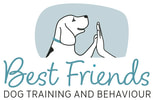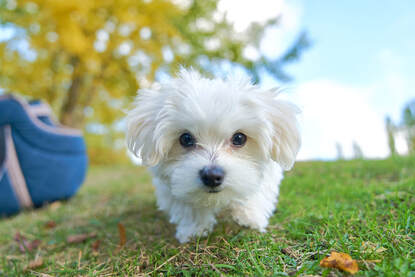The first 16 weeks of life are very important. What puppies learn or don’t learn during their first four months will affect them for the rest of their lives. This stage prepares the puppy for life and, handled well, builds resilience, confidence, and optimism.
During the socialization period puppies are more open to accepting novelty and new experiences. This is the time to introduce them to all the things they are likely to encounter during their lifetime. Their experiences, or lack of experiences, are likely to impact them for the rest of their lives.
Birth to 8 weeks: The critical foundation
Puppies are born deaf and blind but able to feel, taste, smell and cry. Newborn pups are stimulated by their mother, their environment and ideally by the gentle touch of humans.
By about 10 – 16 days old, the puppy’s eyes are open, but vision is poor. Around 3 weeks of age, the ears open and they can hear for the first time. At same time, puppies are beginning to prefer walking over crawling, and can bite instead of only being able to suck.
From four weeks on, puppies develop quickly and are exploring their world every waking hour.
8 to 16 weeks: The critical socialization period, and a sensitive period.
This is the critical socialization period as well as a sensitive period where experiences, both good and bad, can have lasting lifelong effects.
Puppies are investigating and learning about the world during this stage. It is a perfect time to enroll in puppy class where they learn basic skills, and are able to socialize with other puppies and with older dogs. During this period, socialization, handling, and training are critical to the development of the adult dog.
Puppies at this age are charming and sweet and still sleep a lot. Usually they do not act too rough or over stimulated with other dogs and dog-dog play is a priority. It’s important to consider each puppy as a unique individual with a particular temperament and preferences. When pairing dogs for playtime avoid pairing bold, pushy dogs with quieter and more timid dogs.
Dogs at this age still have puppy license. Older dogs will often let them get away with some rude behaivour such as climbing over them, bumping into them, and biting their face, ears or other body parts. They do set rules for pups of this age – teaching them basic manners, sharing, appropriate boundaries and more. But the rules are fairly relaxed. Just as humans have relaxed rules for 2 year old children, the same is true for the adult dog interacting with a pup.
Beginning at 4 weeks puppies become increasingly fearful of novel objects and situations and that peaks around 9 weeks. This doesn’t mean that puppies automatically become fearful. But they can be fearful of UNFAMILIAR people, objects, surfaces, sights, sounds, experiences and environments.
How fearful a puppy becomes depends on:
Genetics: Anxious, fearful and/or shy dogs can pass these traits on to their offspring. While a bad experience can traumatize a dog, genetic influences can be strong regardless of how the dog is raised
Experiences: Early experiences prior to 7 weeks form the puppy’s first understanding of his world. Pups who come from environments that provide few opportunities to learn, explore and move can be far more fearful than pups raised in enriched, supportive environments that provide developmentally appropriate challenges.
Individual neurobiology: However wonderful the rearing environment, however the parents, siblings and other relatives may behave or react, puppies remain individuals just like us. Sometimes, we make assumptions that because a dog is a certain breed or mix, she will be just like others we’ve known but we need to respect the individuality of each puppy.
During the socialization period puppies are more open to accepting novelty and new experiences. This is the time to introduce them to all the things they are likely to encounter during their lifetime. Their experiences, or lack of experiences, are likely to impact them for the rest of their lives.
Birth to 8 weeks: The critical foundation
Puppies are born deaf and blind but able to feel, taste, smell and cry. Newborn pups are stimulated by their mother, their environment and ideally by the gentle touch of humans.
By about 10 – 16 days old, the puppy’s eyes are open, but vision is poor. Around 3 weeks of age, the ears open and they can hear for the first time. At same time, puppies are beginning to prefer walking over crawling, and can bite instead of only being able to suck.
From four weeks on, puppies develop quickly and are exploring their world every waking hour.
8 to 16 weeks: The critical socialization period, and a sensitive period.
This is the critical socialization period as well as a sensitive period where experiences, both good and bad, can have lasting lifelong effects.
Puppies are investigating and learning about the world during this stage. It is a perfect time to enroll in puppy class where they learn basic skills, and are able to socialize with other puppies and with older dogs. During this period, socialization, handling, and training are critical to the development of the adult dog.
Puppies at this age are charming and sweet and still sleep a lot. Usually they do not act too rough or over stimulated with other dogs and dog-dog play is a priority. It’s important to consider each puppy as a unique individual with a particular temperament and preferences. When pairing dogs for playtime avoid pairing bold, pushy dogs with quieter and more timid dogs.
Dogs at this age still have puppy license. Older dogs will often let them get away with some rude behaivour such as climbing over them, bumping into them, and biting their face, ears or other body parts. They do set rules for pups of this age – teaching them basic manners, sharing, appropriate boundaries and more. But the rules are fairly relaxed. Just as humans have relaxed rules for 2 year old children, the same is true for the adult dog interacting with a pup.
Beginning at 4 weeks puppies become increasingly fearful of novel objects and situations and that peaks around 9 weeks. This doesn’t mean that puppies automatically become fearful. But they can be fearful of UNFAMILIAR people, objects, surfaces, sights, sounds, experiences and environments.
How fearful a puppy becomes depends on:
Genetics: Anxious, fearful and/or shy dogs can pass these traits on to their offspring. While a bad experience can traumatize a dog, genetic influences can be strong regardless of how the dog is raised
Experiences: Early experiences prior to 7 weeks form the puppy’s first understanding of his world. Pups who come from environments that provide few opportunities to learn, explore and move can be far more fearful than pups raised in enriched, supportive environments that provide developmentally appropriate challenges.
Individual neurobiology: However wonderful the rearing environment, however the parents, siblings and other relatives may behave or react, puppies remain individuals just like us. Sometimes, we make assumptions that because a dog is a certain breed or mix, she will be just like others we’ve known but we need to respect the individuality of each puppy.


